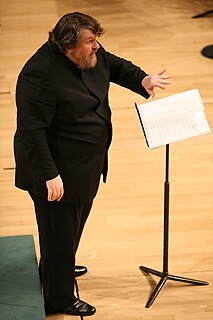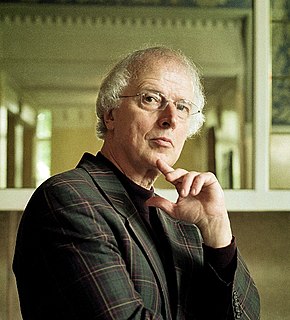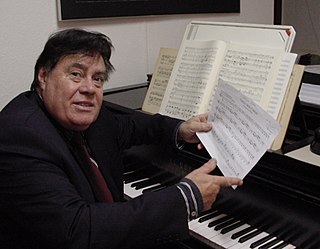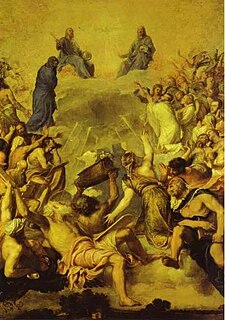
Johann Adolph Hasse was an 18th-century German composer, singer and teacher of music. Immensely popular in his time, Hasse was best known for his prolific operatic output, though he also composed a considerable quantity of sacred music. Married to soprano Faustina Bordoni and a great friend of librettist Pietro Metastasio, whose libretti he frequently set, Hasse was a pivotal figure in the development of opera seria and 18th-century music.

Stuart Oliver Knussen was a British composer and conductor.

The Hamburg State Opera is a German opera company based in Hamburg. Its theatre is located near the square of Gänsemarkt. Since 2015, the current Intendant of the company is Georges Delnon, and the current Generalmusikdirektor of the company is Kent Nagano.

Ernő Dohnányi was a Hungarian composer, pianist and conductor. He used a German form of his name, Ernst von Dohnányi, on most of his published compositions. The "von" implies nobility, and, according to the biography by his third wife, his family was ennobled in 1697 and given a family crest, which she describes in some detail.

Mathis der Maler is an opera by Paul Hindemith. The opera's genesis lay in Hindemith's interest in the Reformation. The work's protagonist, Matthias Grünewald, was an actual historical figure who flourished in that era, and whose art, in particular the Isenheim Altarpiece, inspired many creative figures in the early 20th century, including Joris-Karl Huysmans's novel Là-bas.

Capriccio, Op. 85, is the final opera by German composer Richard Strauss, subtitled "A Conversation Piece for Music". The opera received its premiere performance at the Nationaltheater München on 28 October 1942. Clemens Krauss and Strauss wrote the German libretto. However, the genesis of the libretto came from Stefan Zweig in the 1930s, and Joseph Gregor further developed the idea several years later. Strauss then took on the libretto, but finally recruited Krauss as his collaborator on the opera. Most of the final libretto is by Krauss.

Udo Zimmermann is a German composer, musicologist, opera director and conductor. He worked as a professor of composition, founded a centre for contemporary music in Dresden, and was director of the Leipzig Opera and the Deutsche Oper Berlin. He directed a contemporary music series for the Bayerischer Rundfunk and a European centre of the arts in Hellerau. His operas, especially Weiße Rose, on a topic he set to music twice, have been performed internationally and recorded.

Walter Steffens, is a German composer. He is noted for the diversity of his creative works, but has specialized in opera, as well as music after pictures.

Jonny spielt auf is a German-language opera with words and music by Austrian composer Ernst Krenek about a jazz violinist. The work typified the cultural freedom of the 'golden era' of the Weimar Republic.

Karl V. is an opera, described as a Bühnenwerk mit Musik by Ernst Krenek, his opus 73. The German libretto is by the composer.
Orpheus und Eurydike is an opera by Ernst Krenek. The German text is based on a play by Oskar Kokoschka. Kokoschka began writing his play during his convalescence and it premiered in 1921, one year before Rilke's Sonnets to Orpheus appeared. In 1923 he let it be known that he was looking for a composer to write incidental music. Kokoschka's expressionist, psychological treatment of the Orpheus myth, marked by his passion for Alma Mahler, appealed to Krenek so he approached Kokoschka.
Leben des Orest is a grand opera in five acts with words and music both by Ernst Krenek. It is his Op. 60 and the first of his own libretti with an antique setting. The score is inscribed with the dates of composition: 8 August 1928 – 13 May 1929, and includes indications of recommended cuts made for the first production. It premiered at the Neues Theater in Leipzig on 19 January 1930, and opened at the Kroll Opera House in Berlin in early March of the same year.
Tarquin is a chamber opera by Ernst Krenek to an English libretto by Emmet Lavery. Written in 1940, it is Krenek's only unpublished opera, though a premiere in German translation took place in 1950 in Cologne.
What Price Confidence? is a chamber opera in nine scenes with music and libretto by Ernst Krenek, his Op. 111. This "little drawing room comedy" is set in London at the turn of the 20th century, and features a protagonist not unlike Max in Jonny spielt auf, as the author points out in a preface; it owes something to Melville as well, as do his next two operas.
The Bell Tower is a chamber opera in one act by Ernst Krenek, his Op. 153. The English libretto by the composer was inspired by the novella story by Herman Melville, the events only mysteriously hinted at in the story becoming a point of departure for the explicit dramatic action of Krenek's piece. It was commissioned by the Fromm Foundation and written in 1955–56, receiving its premiere on 17 March 1957 at the University of Illinois.
Cefalo e Procri is a chamber opera in three scenes and a prologue by Ernst Krenek, his Op. 77, begun in 1933 and finished on 3 August 1934. The Italian libretto by Rinaldo Küfferle was commissioned by Universal Edition for the third Venice Festival. The half-hour work was revived at the Gran Teatro La Fenice in Venice in October 2017 as part of a short double-bill with a setting of the 'Lamento di Procri' by Silvia Colasanti, conducted by Tito Ceccherini.
Zeitoper was a short-lived genre of opera associated with Weimar Germany. It is not known when or by whom the term was coined, but by 1928 Kurt Weill was able to complain that it was more a slogan than a description. Like opera buffa it used contemporary settings and characters, comic or at least satiric plots and aimed at musical accessibility. Two distinguishing characteristics are a tendency to incorporate modern technology and frequent allusions to popular music, especially jazz. This last, more than any social satire, earned the suspicion of the political right and ensured that it would not survive into the Nazi era.
Armin Schibler was a Swiss composer.
Das geheime Königreich is an opera in one act with words and music by Ernst Krenek, his Op. 50 and the second of three one-acters which premiered on 6 May 1928 at the Hessisches Staatstheater Wiesbaden as part of the Mai-Festwoche Wiesbaden. It is subtitled Märchenoper in 1 Akt and has been called a satirical fairy-tale opera.










